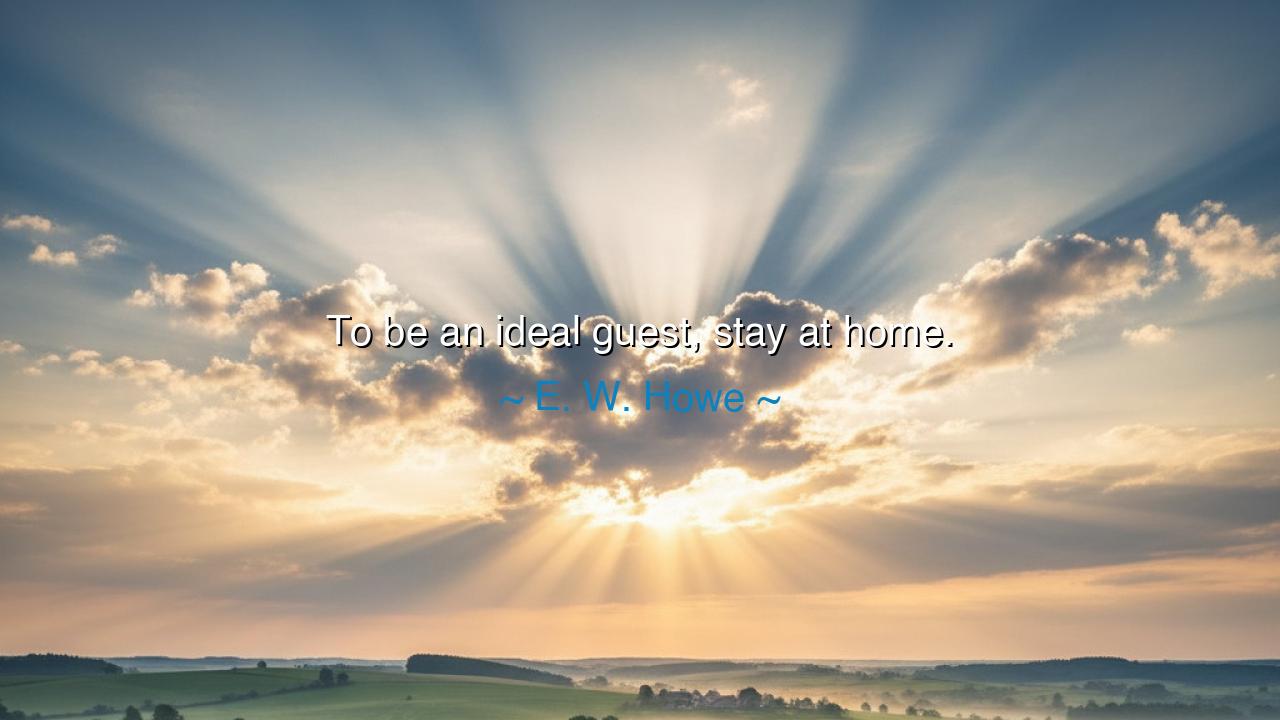
To be an ideal guest, stay at home.






In the sharp and timeless wit of E. W. Howe, we find a truth that is both humorous and profound: “To be an ideal guest, stay at home.” At first glance, this statement seems like jest — a simple quip on the inconveniences of hospitality. Yet beneath its brevity lies the wisdom of human experience, the quiet understanding that presence is both a gift and a burden, that respect for others’ space is one of the highest forms of courtesy. Howe’s words remind us that to dwell in harmony with others, one must first understand the art of restraint — the virtue of consideration, the discipline of self-awareness.
For to be a guest, whether in another’s house, another’s heart, or another’s life, is to enter a sacred space not one’s own. The ancients knew this truth well. Among the Greeks, hospitality — or xenia — was not merely custom, but a moral law, overseen by Zeus Xenios, the god who protected host and guest alike. Yet even the Greeks warned that the guest who overstayed his welcome, who consumed more than he offered, brought misfortune upon himself. The ideal guest, they said, departs before he is missed — leaving gratitude behind, not exhaustion. Howe’s modern jest thus echoes an ancient principle: that true grace lies not in arrival, but in knowing when to depart.
“To stay at home” is not merely advice on etiquette, but a meditation on contentment. The man who can dwell peacefully within his own walls, who finds comfort in his own company, spares the world the weariness of his restlessness. Howe understood that much of social strain arises from the human tendency to wander not from place to place, but from self to self — to seek in others the peace that can only be found within. The ideal guest stays at home not because he is unsociable, but because he is whole; he does not intrude upon the time and energy of others because he has learned to draw strength from solitude.
Consider the example of Diogenes the Cynic, the philosopher who lived in a simple barrel and scorned all excess. When Alexander the Great came to visit him and asked what gift he could offer, Diogenes replied, “Stand out of my sunlight.” Here was a man who needed nothing, demanded nothing, and therefore disturbed no one. He was the ideal guest of the world — self-contained, untroubled, and content. In his independence, he imposed upon no host, and in his freedom, he offended no soul. Like Howe’s wisdom, Diogenes teaches us that the greatest courtesy is to carry no burden that others must bear.
The origin of Howe’s quote lies in his deep observation of human nature. A writer and editor of the late 19th century, he possessed a keen eye for the follies of everyday life. His humor was the humor of truth — gentle but piercing. When he said, “To be an ideal guest, stay at home,” he was speaking not only of literal guests, but of all human relationships. For in every interaction, we are, in a sense, guests — in another’s time, in another’s thoughts, in another’s patience. To be ideal in these exchanges is to bring lightness, not weight; joy, not intrusion; understanding, not demand.
Yet there is also humility in his words. For Howe reminds us that self-restraint is a rare virtue — that many, in their desire to connect, forget that connection requires boundaries. Even love, when too insistent, can become trespass. The wise understand that every relationship, like every visit, needs the grace of distance. Just as the flame burns brighter when given air, so too does affection flourish when given space.
Let this be the lesson: do not impose your presence where it is not needed, nor prolong it beyond its welcome. Learn to find richness in solitude, and you will never be a burden to others. The one who is comfortable in his own company brings peace wherever he goes, for he does not seek to take, but to share. Howe’s humor, then, becomes an eternal teaching — that self-awareness is the foundation of grace, and that those who master it are the truest companions in the house of life.
Action to take: cultivate the art of being alone without loneliness. Before visiting another’s space — whether a home, a conversation, or a relationship — ask yourself what gift you bring. If it is not kindness, calm, or joy, then stay home and refine your spirit until it is. For as E. W. Howe teaches, the ideal guest is one whose presence requires nothing and whose absence leaves peace — a guest who, even from afar, honors the sacred balance between self and world.






AAdministratorAdministrator
Welcome, honored guests. Please leave a comment, we will respond soon